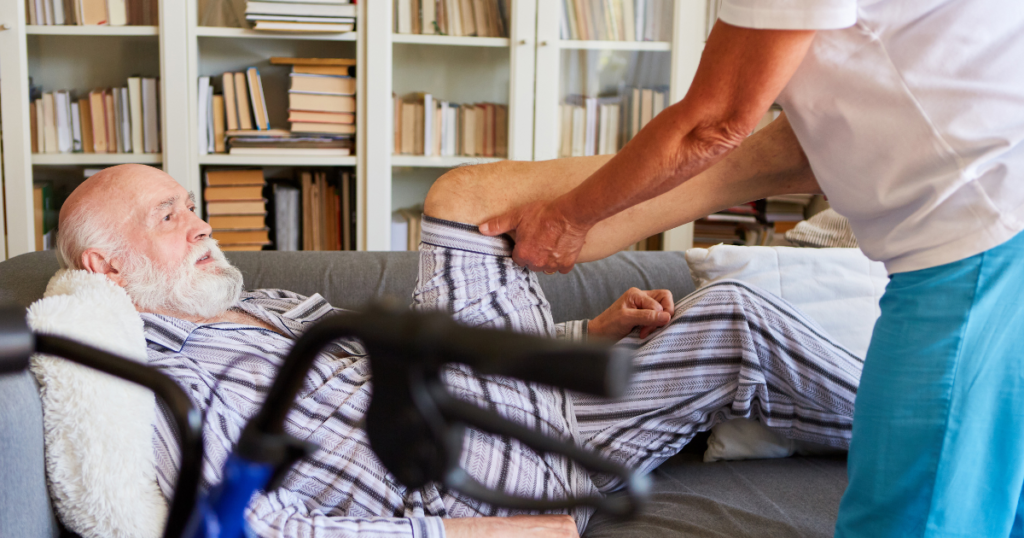Assistance needs are other aging issues such as; mobility issues, chronic pain, and specialized care. Physiotherapy manages such matters for aged persons. You might be surprised to find out that this care coming directly to your home makes it even more convenient.
This section will discuss why home physiotherapy for seniors is safe, effective, and a convenient way to promote home independence and positive health.
Why Home Physiotherapy for Seniors is Important?
Physiotherapy helps seniors stay independent by treating movement problems that come with aging. As people get older, their movements can feel awkward, and they may need to put more effort into doing everyday tasks because they feel stiff, have trouble balancing, or lose flexibility.
Physiotherapy works on these issues to keep older people active and able to join in different activities in society.
Seniors with movement problems benefit from physiotherapy as it helps prevent further issues. Exercises and treatments help them keep their strength and flexibility, making daily tasks easier and lowering the risk of falls and fractures.
Home physiotherapy has its advantages. For example, not having to go to a clinic or hospital is one big strength. For many older people, getting to appointments can be hard or stressful. Home physiotherapy removes this problem by offering top care in a comfortable and familiar place.
Key Goals of Home Physiotherapy
Here are the main goals of home physiotherapy, summarized to highlight its benefits:
- Improving Movement: Seniors do exercises and techniques to help with balance, coordination, and flexibility.
- Managing Pain: Physiotherapy helps manage long-term pain conditions like arthritis, back pain, and joint problems.
- Preventing Falls: Exercises to strengthen muscles, improve coordination, and work on balance help lower the risk of falling, which is common for older people.
- Recovering After Surgery: Recovering from surgeries like hip or knee replacements is more comfortable and effective when a skilled physiotherapist guides recovery at home.
What to Expect During a Home Physiotherapy Session?
At the start of the home physiotherapy, the physiotherapist performs a preliminary assessment test. They identify the mobility status of the senior, examine the concerns affecting mobility, and discuss objectives. So, the plan depends on the personal characteristics and goals of the individual.
Afterwards, the physiotherapist prescribes individual treatment. This plan contains exercises, stretches, and approaches to certain issues. Such exercises might be strengthening, balance, or pain-related depending on the person’s situation.
One unique feature of home physiotherapy is exercising with small household items or equipment, which means that the patient will not be trapped at a particular point in the therapy system that demands certain equipment.
The physiotherapist encourages and estimates progress and modifies the care plan throughout the sessions. The individual attention that is given to the seniors guarantees that they are rightly conducting the exercises and there is no way they would endanger their lives by falling.
Benefits of Home Physiotherapy for Seniors
Here are some benefits of Home Physiotherapy for seniors:
- Convenience
Now you don’t have to travel because therapy comes to you! This reduces the pressure of traveling to appointments and makes it easier to attend sessions.
- Personalized Care
The therapist can adapt treatment to fit the senior’s needs and home environment. Exercises can be adjusted to what’s available at home, making therapy more practical.
- Safe and Comfortable
Being at home lowers anxiety and creates a sense of security, which may improve therapy results. Seniors are more likely to stick to their routine when they feel comfortable.
- Consistency
Home sessions also ensure that one can be more certain with their therapy, there are no issues with scheduling like that of the clinic.
How to Choose the Right Home Physiotherapist?
Following are the tips for you, so you can choose the right Physiotherapist:
- Make sure the physiotherapist is licensed and qualified.
- Look for someone who has worked with older adults before. Seniors have special needs, and the therapist must understand them.
- Ask for referrals from healthcare providers, friends, or family members who have used home physiotherapy.
- Make sure the therapist can fit the senior’s schedule to provide consistent care.
Frequently Asked Questions (FAQs)
Q1: Is home physiotherapy covered by insurance?
Many insurance plans cover home physiotherapy but check with your provider to know the details.
Q2: How long do home physiotherapy sessions last?
Treatment takes 45 minutes to an hour depending on the patient’s requirements and the proposed program.
Q3: Can home physiotherapy help with long-term conditions like arthritis?
Yes! In particular, physiotherapy is very effective in chronic disease management as it helps to reduce pain and improve joint mobility.
Q4: How do I know if home physiotherapy is right for my loved one?
Home physiotherapy may fit if your loved one has movement problems if he or she had surgery recently, or if there is chronic pain in the family.
Q5: What kind of equipment is used during home physiotherapy?
The other equipment that could be used in exercise and therapy are the ones that are portable like resistance bands, a lighter, or even a kitchen utensil.
Conclusion
Home physiotherapy is reinventing seniors’ lives. The other advantages are the ease of use, the individualized nature of the therapy, and the ability to improve mobility, reduce pain, and prevent falls, it is suitable for elderly patients.
Senior citizens are opting for this care more than before, meaning that the future of senior health is looking up. This makes it easier for older individuals not to lock themselves at home and that they enjoy better health.
